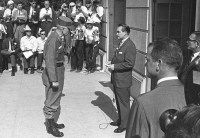The Man Who Took A Chance
My first boss passed away recently.
Paul Cunningham was the editor of The Elba Clipper, the weekly newspaper in my south Alabama hometown when I was a boy. I was intrigued by the paper – not just the stories about what was going on in Elba, but the way the stories got there. The process of journalism.
I decided to do something about it. When I was in the fifth grade, I marched into the Clipper office and asked Mr. Cunningham for a job. He looked me up and down and said, “Not yet.” Two years later, I marched back in, and this time he looked me up and down and said, “All right.” He put me to work in the back room, the print shop, learning how those stories became a physical thing, the newspaper. I learned to set type by hand, make proofs and read them, operate the clanking, clattering machinery, get ink under my fingernails and in my blood. It was newspapering from the ground up. It was the best job I ever had.
Later on, Mr. Cunningham set me to writing a weekly column, “Twenty-five Years Ago in Elba.” Each week, I would search the back issues of the paper and pick out items to put in my column. I think it entertained and informed our readers, and it taught me a lot about my hometown’s history and the people who had put out the newspaper a quarter-century before. It gave me a sense of the legacy of a newspaper, its place in the community through time.
Paul Cunningham was a fine editor. He showed by example that journalism is an honorable profession, and that a newspaper is as crucial a part of a town as schools and churches and government. If people don’t know what’s going on, they move blindly through life. He was an excellent writer who appreciated the power of words to inform, educate, entertain, and – perhaps most importantly in a newspaper – disturb.
As I look back on that time, I realize that the most important thing for me personally was that Mr. Cunningham took a chance on me. He looked me up and down and saw something worth cultivating. He gave me an opportunity that led to a passion. He taught me by example that one of the most important things we do in this life is invest time and interest in a person younger than we are. I’ve tried to pay it forward.
Paul Cunningham was 94 when he passed away – a World War Two veteran, a veteran of a lifetime in the journalism business. In me, a part of him lives on.

